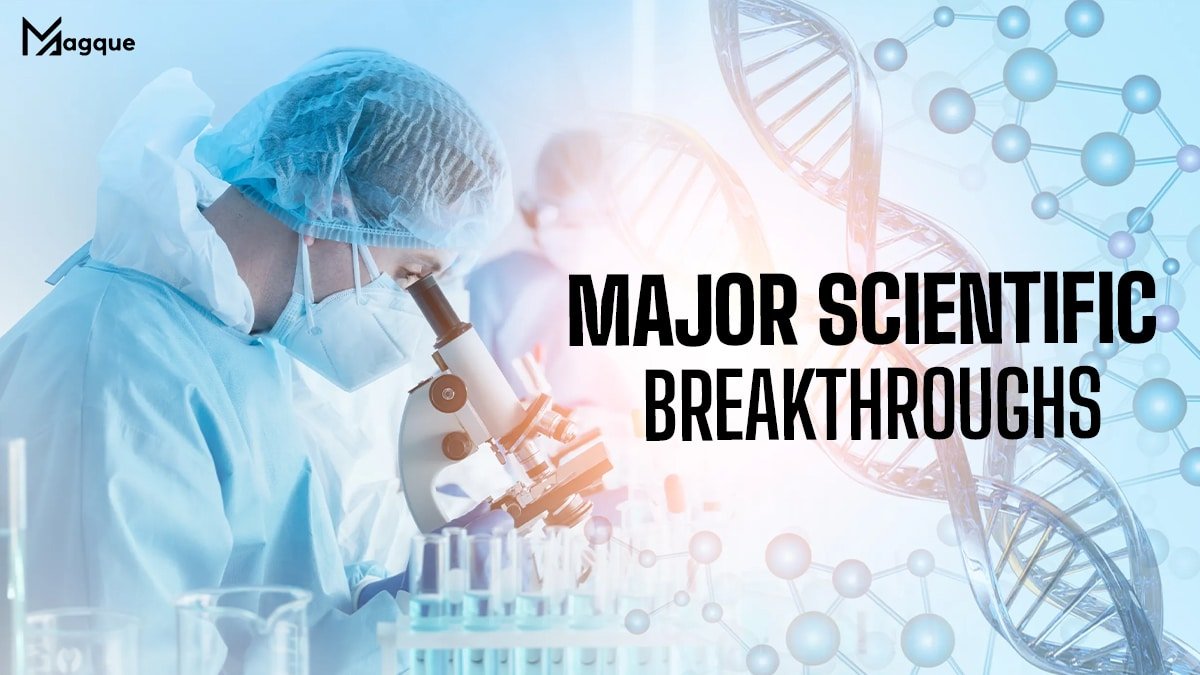In the vast expanse of human history, few things have sparked our collective imagination and driven progress like major scientific breakthroughs. From the moment the wheel began to turn, leading us into realms of transport and industry, to the split second a computer-processed its first byte of information, these moments aren’t just markers of human ingenuity; they’re the stepping stones that have carried us into the future. Today, let’s dive deep into the essence of discovery, focusing on the breakthroughs that have irrevocably changed the course of human history, especially keeping in mind the innovative spirit of Magque.
Have you ever stopped to wonder what life would be like without electricity? It’s almost unthinkable. This brings us to one of the most electrifying moments in science (pun intended) – the harnessing of electricity. Picture this: it’s the 18th century, and Benjamin Franklin is out in a storm, flying a kite. This might seem like a simple childhood pastime to us now. Still, this curiosity and daring led to the understanding that lightning is electric. Fast forward a few decades, and we have Thomas Edison and Nikola Tesla embroiled in the “Current Wars,” pushing the boundaries of how electricity could light up our world. This wasn’t just a breakthrough but the dawn of the modern era.
But let’s not stop there. In the 20th century, they brought a flurry of discoveries, each more groundbreaking than the last. Among these, the discovery of DNA stands out as a fundamental leap in understanding the building blocks of life itself. When Watson and Crick unraveled the double helix structure of DNA in 1953, they didn’t just solve a puzzle; they opened the door to genetic engineering, medical breakthroughs, and debates on ethics and the future of humanity that continue to this day. Imagine, with a simple swab, we can now peek into our ancestral past or glimpse our health’s future – all thanks to a discovery made in a humble lab.
But what about technology that reaches beyond our planet? The Space Race of the mid-20th century wasn’t just about geopolitical rivalry; it was humanity’s first steps into a universe much more extensive than previously imagined. The moment Neil Armstrong set foot on the moon, it wasn’t just a win for the United States but a monumental victory for human curiosity and the indomitable spirit of exploration. It told us that the stars aren’t just twinkles in the night sky; they’re destinations waiting to be reached.
In wrapping up, it’s clear that the journey of scientific discovery is far from over. With every question we answer, a dozen more arise, pushing us to think bigger, delve more profound, and leap further. And as we stand on the brink of discoveries, from the mysteries of quantum computing to the potential of renewable energy sources, one thing remains certain: our quest for knowledge is unending.
So, what does the future hold? If history has taught us anything, the next major scientific breakthrough is just around the corner, waiting for the curious mind that dares to ask, “What if?” And for companies like Magque, staying at the forefront of these innovations isn’t just an option; it’s a necessity. In the relentless pursuit of progress, we’re all part of a grand adventure that shapes not just our world but countless worlds to come.
FAQs
1. What qualifies as a significant scientific breakthrough?
A major scientific breakthrough is a discovery or invention that significantly alters our understanding of the world, introduces a new paradigm in a scientific field, or revolutionizes our daily lives. These breakthroughs often solve long-standing puzzles, open up entirely new research areas, or provide technologies with widespread applications.
2. How did the discovery of penicillin change medicine?
The discovery of penicillin by Alexander Fleming in 1928 marked a turning point in medical history, introducing the era of antibiotics. Before penicillin, bacterial infections like pneumonia, tuberculosis, and gonorrhea were often fatal. Penicillin’s ability to kill bacteria revolutionized the treatment of diseases, saving countless lives and paving the way for developing more antibiotics, fundamentally changing healthcare.
3. What impact did the invention of the internet have on society?
The invention of the internet transformed society by making information universally accessible, connecting people across the globe instantly, and revolutionizing communication. It has reshaped economies, changing how we shop, work, and learn. The internet’s impact extends to every aspect of daily life, including politics, where it has changed how campaigns are run and how constituents engage with their representatives.
4. Can you explain the significance of the theory of relativity?
Einstein’s theory of relativity, comprising his special and general theories, fundamentally changed our understanding of space, time, and gravity. Introduced in the early 20th century, it showed that time is not absolute and can vary for different observers depending on their speed and the gravitational field they are in. This theory has practical applications in GPS technology, where it helps correct time signals from satellites to account for these relativistic effects, ensuring accuracy.
5. What are the potential implications of quantum computing?
Quantum computing represents a major scientific breakthrough in computing technology, using the principles of quantum mechanics to process information. Unlike classical computers, which use bits as the smallest unit of data, quantum computers use qubits, which can represent and store information in a way that allows for more complex and efficient problem-solving. Potential implications include vastly improved data encryption, the ability to solve complex scientific and mathematical problems much faster than current computers, and significant advancements in artificial intelligence and drug discovery.













